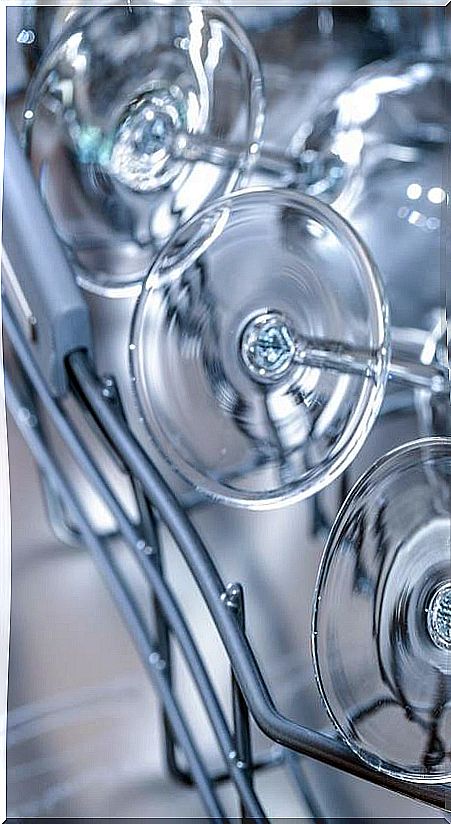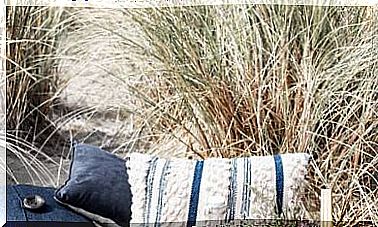Sustainable Tips For Removing Odor From The Dishwasher
If food particles, grease and lime accumulate inside the dishwasher, it may start to smell bad. We explain how to get rid of unpleasant odors with simple and environmentally friendly means.

Hardly anyone would want to do without their dishwasher, it does a great job and at most asks for a shot of salt or a sip of rinse aid every now and then. But those who work hard also want to be treated with care.
If not properly maintained, the dishwasher can start to smell. Unpleasant smells in the dishwasher are almost always due to food residue deposits on the drain filter, in hoses or pipes, on the floor, in corners, or in crevices in the machine.
These organic deposits are a breeding ground for bacteria and mold. Your metabolism in turn produces digestive gases, which are responsible for unpleasant kitchen odors.
What to do when the dishwasher smells bad
If your dishwasher smells bad , the easiest solution is to clean it thoroughly. If you track down and remove all deposits and dirt and then treat your appliance with a frequent cleaning regimen, bad odors should go down in history.
How to proceed step by step:
- Unscrew the filter or strainer insert from the dishwasher, which is located over the drain at the bottom of the machine. This is where most of the organic deposits are likely to have accumulated. Thoroughly clean the strainer with dish soap and a brush. If it is visibly calcified, you should also descale it, otherwise it will quickly re-clog. To do this, soak the filter in a container of concentrated cleaning vinegar for a couple of hours and then use the brush.
- Pipes and hoses can be cleaned with flexible pipe brushes available at hardware stores.
- The rotating spray arms that distribute the water in the machine can also be clogged with lime deposits or contaminated with food debris inside. This not only causes a bad smell, but also affects the cleaning performance of the machine. Depending on the dishwasher model, the wash arms can be removed or opened and cleaned more or less easily.
How to continue cleaning
- Remove the upper and lower rolling baskets from the machine and work the rack with a brush, sponge, or cloth. Ecological home remedies such as baking soda, vinegar or citric acid are recommended as cleaning agents. Used correctly, they are enough to remove lime, grease, bacteria, and mold from the dishwasher.
- Clean the rubber gaskets and the gaskets of the doors of the machine of possible deposits. Don’t make it with vinegar because it can make the gum porous.
- After cleaning, treat your machine with a cleaning cycle with baking soda and vinegar. To do this, put two tablespoons of baking soda in the salt compartment and fill the detergent compartment with vinegar essence. The detergent compartment is only opened when the baking soda has already been able to work in the wash space. Then let the machine run empty and at the highest possible temperature. Be careful when opening as hot vinegar vapor can be irritating.
- To prevent the unpleasant smell from returning to the dishwasher, you should get in the habit of removing the thickest dirt with a paper before putting the dishes on. Thus the residues do not even enter the machine, therefore they cannot accumulate or cause a bad smell.
Wash instead of deodorize
In drugstores and supermarkets you will find special deodorants for the dishwasher, but they serve more to cover than to eliminate bad odors. In addition, these products are made of single-use plastic and do more to generate waste than to tackle the root problem.
Even specialty dishwasher cleaners, sold as tablets, for example, are not really necessary and pollute the environment. Manual cleaning is more effective in removing deposits such as grease, lime, etc., than a preparation that the machine only distributes inside.
The decalogue of good dishwasher care
These tips will help your dishwasher run well for a long time and remain odor-free. They will also help you do as little damage to the environment as possible.
- Choose dishwasher tablets with a water-soluble PVA (polyvinyl acetate) film to save plastic packaging.
- Dishwasher powder is easier to dose. Buying a bulk package will save you additional packaging waste.
- Add dishwasher salt (regeneration salt, special salt) regularly to protect your machine from limescale, especially when the water is hard. This not only prevents stains on dishes and cutlery, but also prevents pipes and hoses from becoming clogged and the cleaning ability of the machine from deteriorating.
- The dishwasher’s green program takes longer, but is even more environmentally friendly because it requires less water and electricity.
- By fully charging your dishwasher before turning it on, you reduce the burden on the environment and your wallet.
- For normal soils, a low or medium temperature wash cycle is sufficient to clean dishes.
- You should run your machine at the highest temperature once a month. This prevents deposits that cannot be removed with normal wash cycles.
- Rinsing dishes before putting them in the dishwasher only consumes more water and energy. It is best to remove coarse dirt with a fork or paper. If a dish doesn’t look good, you can always wash it later.
- If you are considering buying a new dishwasher, find out about the most efficient and durable models. The energy rating must be B (it is the highest possible right now, in 2021) and the reviews in online stores and forums can guide you on the quality of the device.









